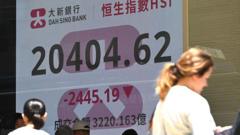Asian stock exchanges saw unprecedented declines on Monday as investors reacted to the tariffs, which threatened global trade dynamics.
### Asian Markets Plunge Following Trump Tariffs: The Worst Decline in Decades

### Asian Markets Plunge Following Trump Tariffs: The Worst Decline in Decades
Asian stock markets are experiencing their most severe falls in decades, heavily influenced by new tariffs announced by US President Donald Trump.
Asian markets are reeling after US President Donald Trump implemented new tariffs that triggered the worst stock market decline in decades. Markets across Asia—ranging from Shanghai to Tokyo—saw massive drops as fears of a global trade war intensified. The Shanghai Composite fell over 8% at one point, while Hong Kong's Hang Seng plummeted by more than 13%, leading to comparisons with a "bloodbath" from analysts. The Nikkei 225 in Japan also recorded a significant downturn of 7.8%.
European markets mirrored this trend, with banking and defense sectors facing the steepest declines. This turmoil follows a turbulent previous week when Trump announced additional tariffs, imposing increases between 10% to 46% on various imports. Given Asia's economic structure, these hikes particularly threaten countries like Japan and South Korea, which confront 26% tariffs, alongside developing nations like Vietnam facing an alarming 46% duty.
Commentators highlight that Asia is directly affected by these tariff increases due to its heavy reliance on US export markets. Investment experts predict that the situation might worsen before it improves, suggesting that while negotiative pathways might exist, higher tariffs appear to be a long-term fixture.
The immediate impact of these tariffs has led to heightened fears of an economic slowdown in the US, which could, in turn, negatively affect Asian exports. The repercussions have been intensified as markets like China, Hong Kong, and Taiwan experienced drastic declines, some seeing their most significant single-day losses ever.
The ASX 200 in Australia logged a 4.2% loss and the South Korean Kospi finished 5.6% lower. The Hang Seng Index recorded its greatest drop since 2008, settling at 13.22%. Economic analysts believe that rising tariffs are creating inflation expectations and raising concerns about a recession.
Goldman Sachs has recently increased its recession probability for the US from 35% to 45% for the next year, while JPMorgan has escalated this forecast to 60%. With many Asian economies reliant on exporting goods to the US, the ramifications of Trump's tariffs pose a serious threat to their stability. Countries such as Vietnam and Bangladesh are already feeling the heat, with Bangladesh facing a harsh 37% duty on its crucial garment exports.
Frank Lavin, a former US Department of Commerce undersecretary, underscores that Asia will bear the brunt of this turmoil, as the region's economic structures depend significantly on the US market. Additionally, China has retaliated with its tariffs, further exacerbating global market instability.
The situation has broader implications, as major US stock indexes suffered over 5% declines last week, indicating a drastic drop not seen since 2020. In the UK, the FTSE 100 also experienced a critical fall of nearly 5%, marking its most considerable plunge in five years. With US futures indicating further declines, analysts caution that the global stock market rout may persist, with losses totaling trillions since Trump announced the new tariffs on imported goods.






















